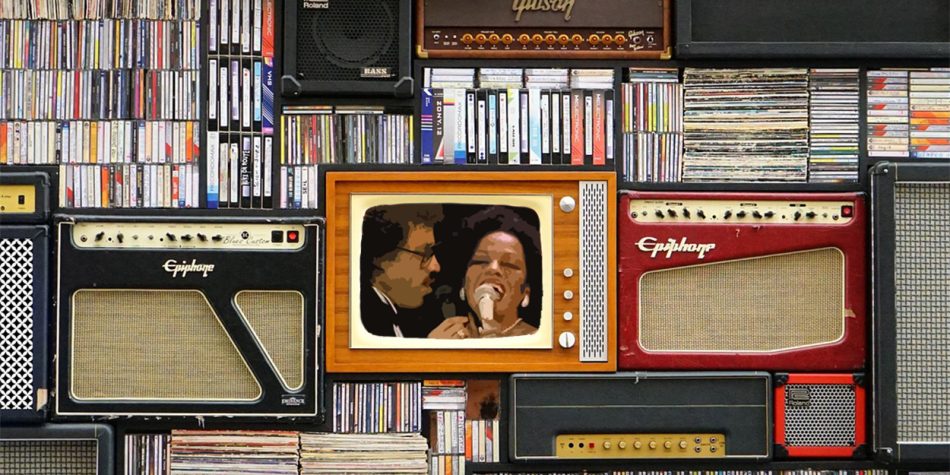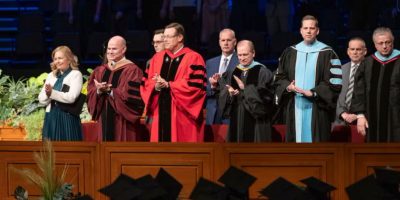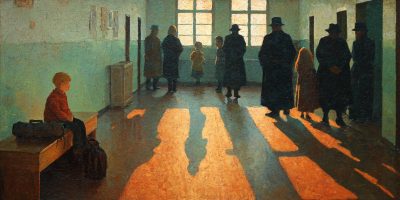For two decades, we have interviewed religious wives and husbands in long-term happy marriages and we asked them how they kept their love alive. We heard relational and religious answers that reflected a variety of wisdom.
Like most Americans of our generations (X and the Boomers), we also grew up hearing the voices of classic rock and roll. Rock also has its own kind of wisdom about keeping love alive—though often profane and crass—and it too enshrines a kind of sacred quest for Everlasting Love. On Valentine’s Day these two visions of love collide, converge, and clash in unique and surprising ways.
Yes, far too much of rock and roll promotes superficial sex and a host of other ideas that militate against enduring love and committed relationships; yes, there has been a decades-long holy war between religious believers and rock music—with rock most often portrayed as a tool of the Devil. This antagonism and tension between those who rock and roll and those who sing “Rock of Ages” has been embraced (and explicitly exploited) by many, including the Rolling Stones on their audaciously titled 1967 album Their Satanic Majesties Request and their later hit “Sympathy for the Devil” featuring Jagger’s famous line, “Pleased to meet you/Hope you guess my name.” From the early metal of Black Sabbath to today, there is much in rock that diametrically opposes religion and enduring love.
But this is not the whole story.
In his book A Mess of Help: From the Crucified Soul of Rock N’ Roll, Episcopalian minister David Zahl, the high priest of the fun-holy alliance between rock and religion, demonstrates that many of the gods of rock and roll have sprinkled messages of grace, redemption, and transcendent love throughout the lyrics of their romantic hymns. Certainly, a trainload of Woodstock-inspired rock has glorified gratuitous “free love,” but some of rock’s most soulful artists have pined instead for a very special, spiritual, and, yes, even eternal kind of love.
Is it possible that humankind’s deepest yearnings for connection, unity, shared meaning, and love (not the ephemeral but the eternal kind) are the shared sacred quest of both religion and the best of rock? In the Bret Michaels-penned rock ballad, “Love’s a Hard Game to Play,” Stevie Nicks (fittingly without Mick and the rest of Fleetwood Mac) painfully warns in her gravely, solo voice, “Remember, starting the fire is easy; the hardest part is learning how to keep the flame.” Indeed, the flames of love and faith are not always eternal—but most of us long for them to be.
Indeed, the flames of love and faith are not always eternal—but most of us long for them to be.
No fewer than a dozen wide-ranging artists have tackled diverse songs titled “Everlasting Love.” The pantheon ranges from Latin (Gloria Estefan), Disco (Carl Carlton, Andy Gibb), R & B (Mary J Blige, Chaka Khan), and a cover of Love Affair’s 1967 version by Irish rock deities, U2. And yes, there is a Gospel version about God’s “Everlasting Love” by CeCe Winans. In his classic alternative version, Howard Jones intones, “He wasn’t looking for a cuddle in the back seat, she wasn’t looking for a five minute thrill . . . this vacancy he meant to permanently fill. . . . Something special, something pure, this is love worth waiting for.” The hook follows, “I need an everlasting love; I need a friend and a lover Divine; an everlasting and precious love; Wait for it, wait for it, give it some time.” The oblique nod to God and the pure, reverent view of love are hardly the fare of Woodstock and unfettered sex.
Although the Beatles were only willing to push things as far as to ask, “Will you still need me, will you still feed me, when I’m 64?” others, like Howard Jones, would idyllically set the bar higher. In 1981, the Lionel Richie and Diana Ross duet, “Endless Love,” would become the best-selling duet in R & B history and has been hailed by Billboard as “the greatest song duet of all-time.” However, with apologies to Oscar Wilde, it is often difficult for life to imitate art. Both Lionel and Diana would personally experience divorce twice.
However frequently it has been smashed, the ideal of “Endless Love” or “Everlasting Love” continues to serve as the holy grail of sacred romance, not only in rock but in various world faiths. In the Eastern Orthodox faith, “Love between wife and husband, as an icon of relationship between Christ and Church, is eternal.” Couples in temples of The Church of Jesus Christ of Latter-day Saints receive “the covenant of eternal marriage” and believe marriages can endure forever. Evangelical theologian Geoffrey Bromiley wrote, “As God made man in his own image, so he made marriage in the image of his own eternal marriage with his people” (p. 43). In Islam, “According to the statements of the Quran and hadiths, the family life that is established in the world will continue forever if both spouses deserve to go to Paradise.” Seven in ten Americans believe in heaven and nine in ten want to marry their soulmate. Whether or not it is part of religious teachings, the longing for soulmate love to last forever seems rooted in the souls of most people.
The question remains, How do we grasp the grail of eternal love? For many happily married couples we have interviewed, their shared faith is central. However, lasting faith in God and religion, like romantic love, is often difficult to sustain. Pew surveys indicate that many righteous brothers (and sisters) have “lost that loving feeling” for God or a long-term faith. Indeed, there are heartbreaks and faith crises that cause some to swear off love of God and their once-beloved faith forever.
Whether or not it is part of religious teachings, the longing for soulmate love to last forever seems rooted in the souls of most people.
This is unfortunate because considerable recent research connects shared faith among married couples with a number of encouraging romantic benefits. Family scholars Dew and Willoughby recently summarized, “Our findings suggest that a new adjective best describes marital sex between religious couples: ‘satisfying.’” Apparently, contra-Mick Jagger, some can get satisfaction. The Rolling Stones nailed it elsewhere, however: “You can’t always get what you want, but sometimes you get what you need.”
A study by relationship scholar Dean Busby and colleagues similarly found that “the longer a couple waited to become sexually involved, the better their sexual quality, relationship communication, relationship satisfaction, and perceived relationship stability was in marriage.”
Continuing on the note of sex, most faiths teach the spiritual value of sexual restraint, the relational value of sexual fidelity, and the social value of sexual responsibility. However, the Rolling Stones do not provide much lyrical support here.
Where can we turn for a fusion of sonic rock, soulful religion, and spiritual romance? Emanating from the boom box of Lloyd Dobbler (John Cusak) in the romantic cult-classic film Say Anything, Peter Gabriel’s yearning voice sings, “In your eyes (the light, the heat); In your eyes (I am complete); In your eyes (I see the doorways of a thousand churches); In your eyes (the resolution of all the fruitless searches); Oh, I see the light and the heat (in your eyes). Oh, I want to be that complete (in your eyes).”
So, is the elusive but sacred quest for eternal love in rock and religion realized in the eyes of a lover or in the eyes of the Creator? The answer from many of the happily married wives and husbands we have interviewed was that “to be that complete,” we need to gaze in rapture at both. So, grab the hands of the one you love, give thanks to the One you love above, and then… Dance.

















